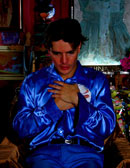
DEAD GIRL’S FEAST
Brazil, 2008, 115 minutes, Colour.
Jackson Antunes, Giuliano Cazarre, Daniel D’ Oliveira.
Directed by Matheus Nachtergaele.
For those in search of bizarre stories, here is one that certainly fits the bill.
We spend a day on Brazil’s Negro River with a small community. They are preparing for and then celebrating the 20th feast of the Dead Girl which centres on a young man whom they regard as The Saint. Years earlier, the boy had retrieved only the tattered dress (which is kept as a relic in a shrine) of a girl mauled by a mongrel dog. They considered that her spirit was in The Saint. He is reputed to be able to heal and to tell the future.
This is a picture of religious syncretism in action. While there is a basis in Catholicism, with signs of the cross, statues and devotion, there is also a strong foundation of nature religions of the Amazon, the presence of divine powers in all of nature, which is also echoed in the prayers. While the celebrations have been updated with small rock concert style entertainment, there is a great deal of drinking by the men, and the people still want The Saint to bless them and to reveal something.
However, The Saint himself (who is pampered by his aunt, exploited, even sexually, by his father and criticised by the dead girl’s brother) is a spoilt and petulant character, completely self-absorbed until a visit from his allegedly dead mother disturbs him.
This is not your usual story. The narrative is something of a hodge-podge of incidents but the picture of this community and its religious practices is intriguing.
1.The Brazilian interest of the film and themes? Customs, indigenous peoples, religion and superstition? For non-Brazilian audiences?
2.The Amazon, the river, the jungle, the village, the remoteness, the modern aspects, homes, the village centre, the celebrations? The Feast of the Dead Girl?
3.The musical score, the songs, the dances, religious music?
4.The background of religious syncretism? The Catholic tradition, language, shrines, piety? Nature gods, power? Healing and prophecy? Superstition? Celebration?
5.Twenty-four hours in the village, the preparation for the feast, the celebration, the background with the Saint?
6.The opening with Tadeu, his relationship with the dead girl, his work, in the village, anger, critique of the feast, having no faith, yet his support of the Saint and his participation in the feast?
7.The portrait of the father, waking up, relationships, exploiting his son, drinking, his wife, his life, the sexual relationship with his son – presented explicitly?
8.The Saint, his age, waking up, dressing, his character, petulance, self-absorption, his wants, his demands on his aunt, yet not giving her the water when she needed it, drinking, the herbs, working, the fluctuating moods, his fears, the sexuality and his father, the day, dressing for the feast, ousting Lucia, the ceremony, the apparition of his mother, the discussion, the background of her death, the story that he had received, her words, return, his being upset? The dead girl not giving him any words of prophecy? The procession, the word ‘pain’, the message, going into the river?
9.The mother, her background, the suicide, her return, wanting a blessing, the confrontation with her son?
10.The people and the Saint, pampering him, the women, his aunt, Lucia and her devotion? The scepticism of the men?
11.The people coming for the blessings?
12.The feast, the celebration, the people, the rock concert, the dancing?
13.Insight into this group of people, their experience, religion, Brazil, Latin America?